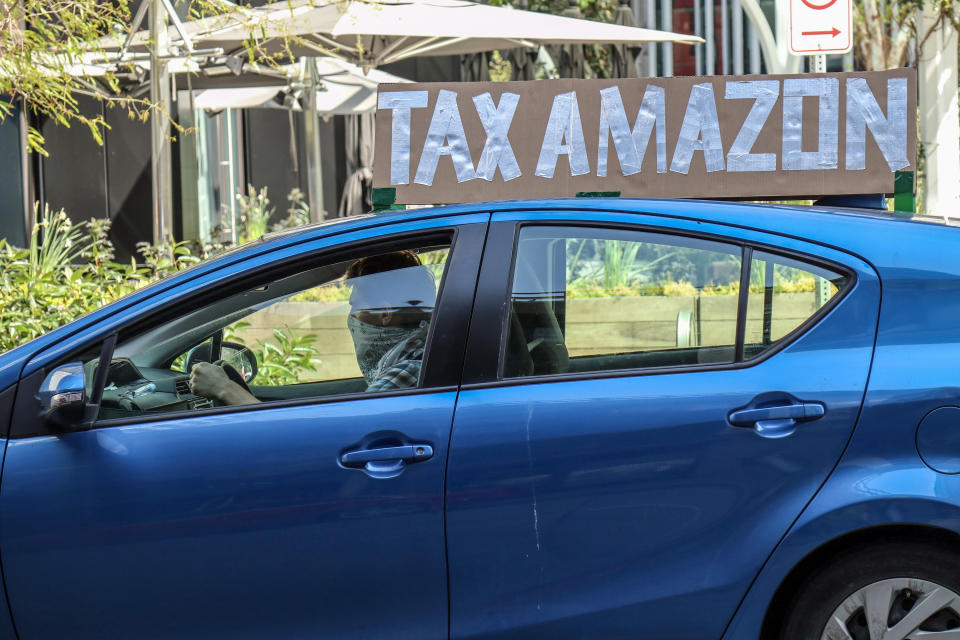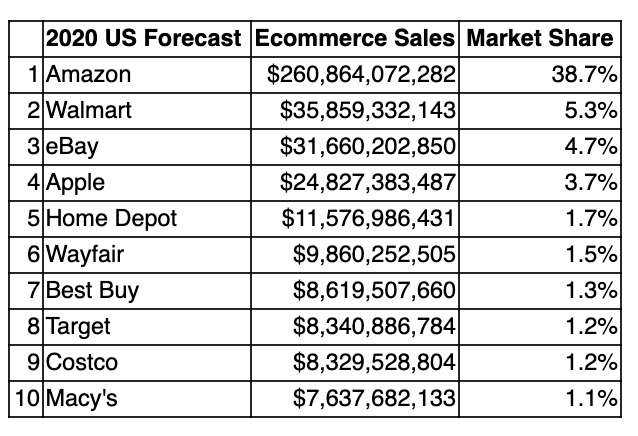Biden hits Amazon on taxes, which may benefit from the coronavirus outbreak
Amazon (AMZN) has been one of the main beneficiaries of the coronavirus pandemic, with consumers flocking to its platform as lockdowns keep them indoors, and away from brick-and-mortar outlets.
The online retail giant, which recorded a big jump in first quarter revenues, is one of the few companies flush enough to hire during the COVID-19 crisis that has cost the U.S. economy nearly 40 millions jobs. Yet Amazon has come under persistent fire from both sides of the political aisle for its market dominance, employment policies — and especially its tax strategies.
The latest salvo came from presumptive Democratic presidential nominee Joe Biden, who Friday admonished Amazon to “start paying their taxes” and demanded that the web retail behemoth and other big companies “play the game fairly.”
The former Vice President told CNBC in an interview that “I don’t think any company, I don’t give a damn how big they are...should absolutely be in a position where they pay no tax and make billions and billions and billions of dollars.”
In response to an inquiry from Yahoo Finance, an Amazon spokesperson pointed to a Twitter exchange from last year, in which the company insisted that it pays “every penny we owe,” while investing billions of dollars in the economy.
We’ve paid $2.6B in corporate taxes since 2016. We pay every penny we owe. Congress designed tax laws to encourage companies to reinvest in the American economy. We have. $200B in investments since 2011 & 300K US jobs. Assume VP Biden’s complaint is w/ the tax code, not Amazon. https://t.co/uPUv1Tzlma
— Amazon News (@amazonnews) June 13, 2019
However, Biden’s remarks added fuel to a fire that’s been raging for at least a few years. In 2019, the company successfully whittled its effective rate to 1.2% on $13 billion in profits, something that stirred lots of controversy, and a year earlier, it was actually owed a refund on $11 billion in profits.
While the numbers prove its savviness for capitalizing on advantages under the U.S. Tax Code, newly available deductions under the CARES Act make tax savings even more accessible. And with the windfalls, tax experts believe Amazon appears positioned to reduce its federal tax liability to at or near zero, again, in 2020.
“I'd say their tax rate will be a lot closer to zero than to 21%,” said Matthew Gardner, a senior fellow at the Institute on Taxation and Economic Policy, referencing the current U.S. corporate tax rate.
To be sure, it remains too early to predict Amazon’s pretax income for the full year, and therefore whether it will be able to offset any tax liability.
However, Gardner and Caroline Bruckner, a tax professor and managing director at American University’s Tax Policy Center, say Amazon’s behavior through the first quarter suggests it is on par to take advantage of some of the same legally permissible deductions and credits that it has enjoyed for the past two tax years.
“I don’t see how they don’t,” get close to zero, Bruckner said. “They’re capitalizing on a business strategy that they already had.”
Amazon’s 3 pillars of tax mitigation

Both Gardner and Bruckner agree that three strategies employed by Amazon have historically resulted in major tax mitigation. The most significant is the use of accelerated depreciation that permits U.S. companies to immediately write off the full depreciation of certain capital investments.
“What the quarterly report tells you is that they've ramped up their capital spending so far this year relative to what they did last year,” Gardner said. During the first three months of 2020, Amazon’s purchases of property and equipment totaled approximately $6.8. billion, which is more than twice what they spent for the category in the same quarter for 2019.
Given that those kinds of purchases are an indicator of tapping depreciation breaks, “Amazon's going to be able to substantially reduce its income tax liability in 2020 using depreciation,” Gardner added.
Two other strategies include credits for expenditures on research and development, and deductions for stock-based compensation. Amazon has used both in the past, but they are more difficult to handicap because they are less frequently required in public disclosures.
As of December 21, 2019, Amazon had approximately $1.7 billion of unused federal tax credits available to offset future tax liability and approximately $8.6 billion of foreign net operating loss carry forward, Bruckner said. She expects at least a portion of each to be used for additional offsets in the 2020 tax year.
In its first quarter earnings report, Amazon reported a 26% jump in year over year revenues to $75.45 billion on operating income of approximately $4 billion.
However, Amazon CEO Jeff Bezos wrote in the report that the company intended to spend all of its expected $4 billion Q2 operating profits on “COVID-related expenses” that include personal protective equipment (PPE), increased wages, sanitation of warehouses and equipment, and costs tied to social distancing practices.
And according to Bruckner, “When you buy those things they are deductible for tax purposes. Any tangible property is most likely going to be expensed. They pour money into [research and development] and they claim all the corresponding tax credits that they can.”
She added that COVID-19-related liability claims from customers and employees could become another major deductible cost for Amazon in the future.
As the coronavirus lockdowns squeeze both big and small companies, Amazon is hardly in need of a boost from the tax system. The crisis has only solidified the company’s e-commerce dominance — an effect that analysts estimate will become even more entrenched.
With nearly 40% market share, Amazon stands to gobble up the largest piece of the web retail pie, according to Andrew Lipsman, principal analyst for eMarketer. Though he believes that shoppers who have converted their brick-and-mortar habits to online will likely revert to their former habits after the lockdowns end.

The Tax Policy’s Gardner said that Amazon’s pledge to spend heavily on COVID-related expenditures — and the likelihood it will tap credits and deductions to heavily curb its tax burden — should prompt lawmakers to plug the loopholes, if they want to avoid exacerbated revenue shortfalls expected from the slowed economy.
“It's a pretty good time for Congress to be asking hard questions about the functionality of all the tax breaks we offer,” Gardner said.
Alexis Keenan is a reporter for Yahoo Finance and former litigation attorney. Follow Alexis Keenan on Twitter @alexiskweed.
[Click here for more of Yahoo Finance’s coronavirus coverage: Personal finance tips, news, policy, graphics & more from Yahoo Finance]
Follow Yahoo Finance on Twitter, Facebook, Instagram, Flipboard, LinkedIn, and reddit.
Find live stock market quotes and the latest business and finance news.

 money
money 
